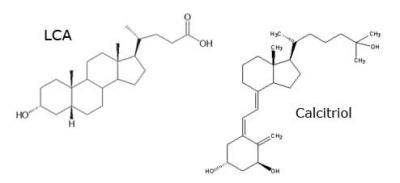Bile acid derivatives can turn on the vitamin D receptor (VDR) without causing excess calcium buildup, researchers report, a finding that could lead to vitamin D therapies for conditions beyond just bone and skin disorders.
While calcium balance may be the most well-known role of vitamin D, this molecule –through VDR binding– regulates many functions including immunity and cell growth and thus has diverse therapeutic potential. However, while vitamin D-based drugs are effective against some cancers and microbial infections, the risk of excess blood calcium has limited their clinical use.

Bile acids, compounds secreted from the liver that aid in digestion, can also bind to the VDR, though not as strongly. However, Makoto Makishima and colleagues found that derivates of the bile acid LCA (lithocolic acid) are very potent VDR activators. Interestingly, though, these acids did not induce the expression of calcium channels in various cell types.
The researchers then compared the effects of orally-fed vitamin D or LCA derivatives on mice; they found that LCA could promote VDR activation in mice without causing calcium buildup and weight loss that was observed in vitamin D animals. This study suggests bile acid derivates might have solid clinical potential.
Article: Michiyasu Ishizawa, Manabu Matsunawa, Ryutaro Adachi, Shigeyuki Uno, Kazumasa Ikeda, Hiroyuki Masuno, Masato Shimizu, Ken-ichi Iwasaki, Sachiko Yamada, and Makoto Makishima, Lithocholic acid derivatives act as selective vitamin D receptor modulators without inducing hypercalcemia, J. Lipid Res. 2008 49: 763-772. First Published on January 7, 2008; doi:10.1194/jlr.M700293-JLR200